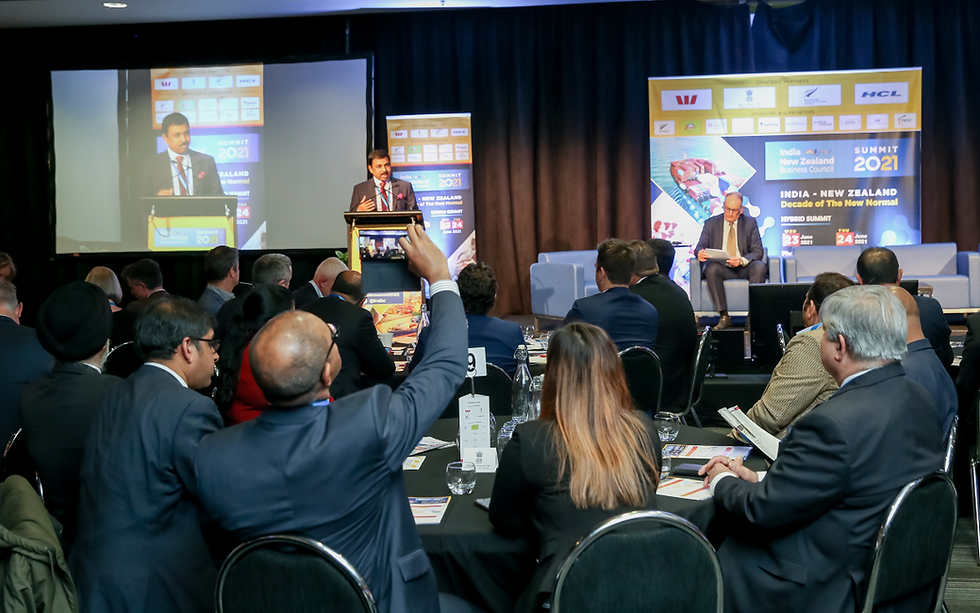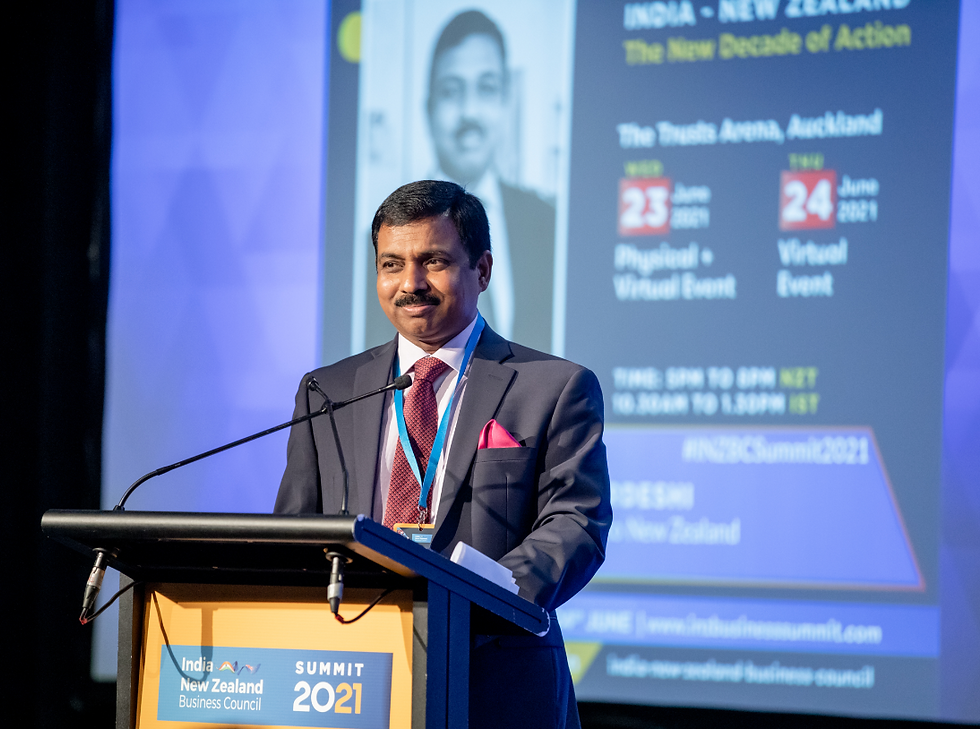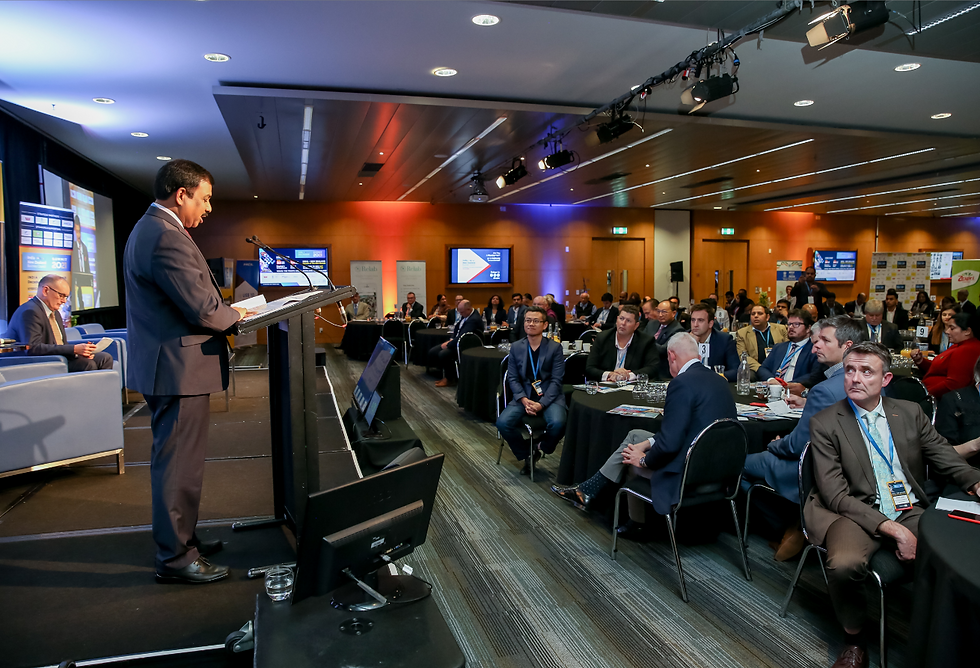India-New Zealand Relations: An Indo-Pacific Approach, keynote speech by HE Muktesh Pardeshi
- INZBC Secretariat
- Jul 1, 2021
- 4 min read
India-New Zealand Relations: An Indo-Pacific Approach
Hon. Foreign Minister Nanaia Mahuta
Hon. Members of Parliament
Chairperson INZBC, Mr. Sameer Handa
Distinguished Panellists, guests and participants:
I would like to begin by congratulating India New Zealand Business Council for holding this annual Business Summit in the shadow of a global pandemic and the resultant challenges.
As the High Commissioner, I feel most gratified that the Summit has seen participation by FM Hon. Nanaia Mahuta and India’s MoS for External Affairs Shri V. Muralitharan. Less than a month ago, on 25th May 2021, we had Foreign Office Consultations and on 1st March, two Foreign Ministers engaged in an introductory and wide-ranging telephonic conversation. This two-day Summit would surely help in building momentum in bilateral conversations which took place during the high-level visit led by the then DPM & FM Hon. Winston Peters to India in February 2020.
My felicitations to Mr. Sameer Handa, the Chairperson of INZBC on being awarded NZ Order of Merit for his services to business and India-NZ relations.

The theme of the Summit is: Decade of the New Normal. As we speak today, we have seven decades of India-New Zealand relations behind us to reflect upon and to help chart a new framework for developing a deeper partnership over the current decade.
The concept of Indo-Pacific has gained increasing salience in recent years. Besides India, several countries and regions have articulated their own concept and vision for the Indo-Pacific, including Japan, the U.S., Australia, ASEAN, France, Germany, the Netherlands, the UK and most recently, the EU.
The Indo-Pacific signifies the confluence of the Indian and Pacific Oceans which can no longer be viewed as separate spheres. It is a maritime space connecting Africa, Asia, Oceania, and the Pacific Coast of the Americas through which over 50% of global trade passes. It is home to over 64% of the world’s population and contributes to over 62% of global GDP. Therefore, the security, stability, peace and prosperity of this vast region is important not only regionally but globally too.
Historically, the Indian and Pacific Oceans have enjoyed a deep connect, facilitating the flow of goods and people and building cultural linkages. In that sense, the Indo-Pacific has always been a seamless contiguous region. And the best example is the historical evolution of India-NZ relations. The early imperial contacts and settlements suggest merging of maritime spaces between Indian and Pacific Oceans. After the first exploratory voyage of Captain James Cook in 1769, NZ was regularly visited by explorers and other sailors, missionaries and traders. This led to early contacts between the two countries which developed in the shadow of the British Empire. Consumer goods from India- tea, rum, tobacco, rice and spices- were exchanged for NZ timber. This also led to labour migration from India from the 1890s.


In 1947, both countries became independent. NZ leadership welcomed the birth of the new Indian nation and persuaded Prime Minister Jawaharlal Nehru to remain in the Commonwealth. Reflective of the spirit of cordial relations, a Trade Commission was opened by India in Wellington in 1950, which was upgraded to a High Commission within two years, in 1952. In 1953, under Colombo Plan, India received aid $1mn from NZ for the establishment of the All-India Medical Institute in New Delhi. Cricketing links began with the New Zealand cricket team’s tour of India in 1955-56. In 1958, Labour PM Walter Nash visited India. NZ opened its Mission at AHC level on 6 December 1958. The Commonwealth became the defining bond.
It was in the 1990s that NZ began opening to Asia with greater focus on China and SE Asia. Traditionally, New Zealand’s strategic focus has been on Australia and the South Pacific. It was ten years ago in 2011 that India was included as part of NZ’s ‘Uplift Strategy’. The strategy was trade-centric. The FTA became the mantra after a successful FTA with China was concluded in 2008.
Until two years back, the term Indo‑Pacific did not resonate much in New Zealand. However, speaking at ICWA in New Delhi on 27 February 2020 on “The Indo-Pacific: from principles to partnerships’, visiting DPM Winston Peters made a very clear statement on Indo-Pacific: “Like India, New Zealand has direct interests in the Indo-Pacific’s security...It unites New Zealand and India in a shared strategic geography as well as a shared commitment to a stable, peaceful, open and secure region”.
New Zealand’s perspective is rooted in the Pacific. The Indo-Pacific partners will often look to NZ for collaboration, and cooperation on engaging in the Pacific context.
India formally articulated its vision for the Indo-Pacific at the Shangri La Dialogue in June 2018 where Prime Minister Narendra Modi spoke about a free, open, inclusive Indo-Pacific region, which embraces all countries in a common pursuit of progress and prosperity. It builds on India’s Act East Policy and its doctrine of Security and Growth for All in the Region (SAGAR) announced in 2014 and 2015 respectively. India's vision for the Indo-Pacific is a positive one that includes all nations in the geography and beyond who have a stake in it. ASEAN centrality and unity lie at the heart of this Indo-Pacific. The Vision emphasises the importance of building infrastructure and connectivity, based on principles of respect for sovereignty and territorial integrity, consultation, good governance, and sustainability.
To give a practical shape to this cooperative and collaborative approach in the Indo-Pacific, India proposed the Indo-Pacific Oceans’ Initiative (IPOI) at the East Asia Summit (EAS) in November 2019. It has seven central pillars: Maritime Security, Maritime Ecology, Maritime Resources, Capacity Building and Resource Sharing, Disaster Risk Reduction and Management, Science, Technology and Academic Cooperation, and Trade Connectivity and Maritime Transport. While India will be the driving force behind all areas identified under the IPOI, we are also actively seeking partnerships with like-minded countries like NZ to lead on any of the pillars of IPOI.
As I mentioned earlier, India-NZ relations first evolved in the shadow of the British Empire and then, after Independence, the relations developed on the strength of Commonwealth linkages. I visualise a new phase in our relationship emerging- a phase of strategic ties characterised by the values and interests of an Indo-Pacific region. I believe that India-New Zealand relations will advance to the next level based on three pillars: first, a comprehensive political-security relations inspired by Indo-Pacific approach; second, a mutually beneficial trade, technology, innovation and economic collaborative partnership and third, close people to people links, driven by a quarter million people of Indian diaspora.
I thank you for your attention.


